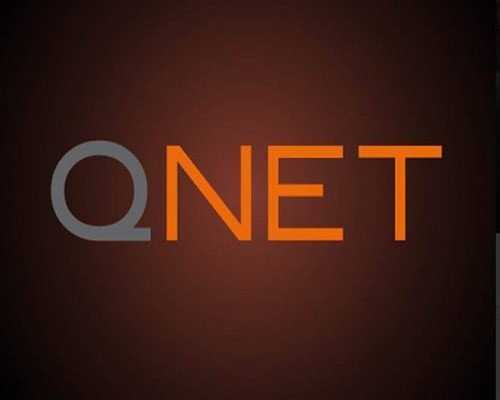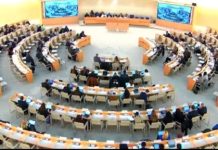Inside QNet Pyramid Scam Scheme
By Yankuba Jallow
In what looks like a daylight robbery, Foroyaa’s four months investigation has found a global e-marketing group operating in The Gambia amassing wealth from Gambians, including innocent students.
Dubbed QNet, the company does this under the ploy that they organize “Business Management” with the promise to give the students what they refer to as “International Certificate”.
In this piece, we unveil the untold stories of many Gambians, including students who became victims of QNet’s alleged financial fraud.
This pyramid-like-scheme trapped Gambians into luring fellow Gambians to venture into a business dubious in toto; yet persisting because most victims were swayed into the business by those they trusted.
It may seem like a movie-like-script, but these scenes didn’t come from Hollywood. The setting is in the smallest country in mainland Africa- The Gambia, home to little over two million people, many of whom struggle daily to make ends meet.
Victim 1:
EnterFatima Bah, a teacher at Sinchu Baliya Lower Basic School. Bah was introduced to QNet by her colleague teacher, Mariama Njie, who was in the business.
Her friend, Njie, told her she will introduce her to something that has the potential for her to get rid of poverty. Anxious due her condition and that of the family (taking care of her mother from her little earnings from teaching) Bah would agree to hear the offer.
At the meeting with her friend together with QNet officials at the QNet office, formerly at Kairaba Avenue, Bah said she was told to make payment of any of the following; D36,000, D37,000 or D38,000.
“I was never convinced about their business. Mariama would come to my house every day trying to convince me to join but I told her I cannot join because I am the breadwinner of my family,” she recalled. “I told her my salary is very little and I cannot pay for it. She insisted that if I join I will get out of poverty.”
But Bah’s colleague, Njie, was persistent. She suggested to her to take a loan from the bank to make her payment. Bah declined owing to the fact that at the time, she had a loan with the teachers’ credit union which she was struggling to pay. Nonetheless, adamant Njie would come to her every weekend persuading her to join the business. And she said Njie got her a guarantor at the bank to secure a loan of D38,000 because she was not saving with them.
“I received a loan of D38,000 from GTBank which I handed over to Mariama. I was called at the QNet office where they explained the business to me further but I told them I am not interested,” she said. “Honestly, I am suffering. She really disturbed me. The bank is deducting me D1870 every month and I am the breadwinner of my family.”
Bah said the deduction began in October 2018 and would last for 3 years. She said she does not know the whereabouts of Njie as she always calls her but she wouldn’t pick the calls. In a bid to upkeep her personal and family needs plus repayment of the bank loan, Bah now teaches in double shifts from Monday to Friday.
“I want to apply to college but I can’t do that now. I am facing serious challenges. I am in a tough time,” she said.
Njie, whom Bah accused of luring her into the business, was contacted by Foroyaa for comment. She told us this: “I don’t have anything to do with QNet. Go to QNet and ask them questions.”
What We Know About QNet?
The Quality Networking Entrusted Transactions (QNET) is an e-commerce company that operates under the Infinity Millennial with offices across the country, including Abuko, Farato and as far as Basse in Upper River Region. Founded in 1998 in Asia and introduced in Africa around 2008, QNET has three registered groups in The Gambia using different names.
The first one is Q-Net Company registered by one Gambian national Wurri Sidibeh, to sell watches and jewelleries on the 27th July 2017. The second one is QUESTNET Gambia Limited registered on the 8th December 2017. QUESTNET company director is Abubakar Marico who owns 85% of the shares, Muhammed Sillah owns 5% of the shares, Abubakar Marico (a Burkinabe) owns 5% of the shares and Kawon Jikineh owns 5% of the shares. The third is QNET registered on the 21st November 2017 by one Sulayman Jallow.
The Registrar of Companies informed Foroyaa that none of the three companies have filed their annual returns since registration in 2017.
Dr Gibril Jaw, the Chief Executive Officer of the National Accreditation and Quality Assurance Authority, said his office does not give any license to QNet to provide any training or classes for people. He said NAQAA regulates education and training for post-secondary level up to doctorate degree.
“There is nothing like QNet in our database. So, it is not part of institutions accredited by NAQAA,” Dr Jaw said.
The doctorate degree holder took time to advise all learners to always consult with NAQAA before they register, saying they are here to protect the interest of people. He said NAQAA will treat the issue of QNet with seriousness.
“NAQAA does not know QNet. There was no license issued to QNet. I have the list of institutions, but QNet is not part of it,” he said. “Before anybody registers, it is better to seek advice from NAQAA to see the status of the institution to know whether they are recognised and registered.”
He said NAQAA’s mandate extends to regulations of all post-secondary education levels as well as the informal sector through apprenticeship programmes.
“Online, face to face, sandwich and hybrid programmes are all regulated by NAQAA,” Dr Jaw said.
Section 4 of the NAQAA Act 2015 which provides for the function of NAQAA makes it mandatory for all education and training institutions among others to obtain a license from NAQAA for their programmes. NAQAA is also tasked under the same provision to monitor and oversee the quality assurances of tertiary and higher education institutions for continuous quality improvement. The authority is also tasked to develop criteria and standards for the establishment, registration and accreditation of institutions.
QNET is collecting thirty-six thousand and more from young Gambians with the promise that they will provide them business management classes and at the end of the course will give them an “International Certificate”.
One can become a member of QNet also known as Queshnet in The Gambia by paying an amount ranging between thirty-five thousand and forty thousand dalasis.
Despite the different names of the companies, the different QNet groups have the same motive which is to amass wealth for the owners at the expense of innocent Gambians.
How do People Join?
People are invited to join QNet by those they trust. Friends invite friends. It is a principle of QNet that the customers should invite people who trust them. The QNet services and products are not advertised on radio and/or television, instead, customers are used to lure more people into the business.
First, the customer would be asked to sign documents committing them to several things after making the payment of thirty-six thousand five hundred or more. Secondly, it is mandatory to every person who joins QNet to bring people. The person would first bring two people and then help those two to bring two more people each. One’s status increases if the person succeeds in luring more people into the business. Just like a pyramid, from one person, it grows with more people by the day.
People join QNet for different reasons; this includes education, sports, business and health among others. QNet is an online business, but in The Gambia, they are collecting monies from students and elders with the promise that they hold business management classes. The victims said QNet promised them that they will transform them into millionaires by making their dreams become a reality for them.
Foroyaa have received WhatsApp voice notes of alleged victims’ conversation with members of QNet encouraging them to join and telling them “it is a fast way of becoming millionaires.
The crazy mechanism around QNet is that they won’t divulge their business to any person until you make full payment and you won’t be acquainted with them until you join their introduction sessions. The victims said they only came to know about them after signing the documents. It is then they would realize that QNet’s promises are far different from what they truly say they are.
The QNet scheme was launched with the objective of giving people the prospect of making money quickly and easily. However, the alleged victims said the scheme is fraudulent, accusing the company of misrepresenting their terms and conditions. Most of the customers said the terms and conditions were not explained to them clearly.
The nature of the scheme or business is intertwined in the interest of the company, such that persons contacted, incentives offered, and the training sessions they organise for their people, raise an alarm bell.
Students Are A Target:
Most of the customers of QNet are young people, mainly fresh graduates from high school.
QNet companies would promise the students that they will help them travel abroad to further their education in places like Canada and the United States among others. They tell the students that they have partnership with different universities in Europe and America to tempt them to join. Each student is required to pay D36,500 as the minimum fee to join the business whereas some paid D45,000.
The company agents would convince them to join with several promises. These people will in turn put pressure on their parents and families to get them the amount to register with Qnet.
Five of the victims informed Foroyaa that they disturbed their parents to sell their cattle to raise funds to secure registration with QNet with the anticipation that they would be paid every week $225 equivalent to D11,250. But the promise of $225 per week is never put on paper.
Our investigation revealed that all the customers who became victims through the alleged swindling activities of QNet were promised $225. According to the victims, this promise has never been fulfilled even once.
After making the payment, QNet will refuse to refund any, hiding under the pretext that once money is wired outside the country, it cannot be sent back to the Gambia.
All the victims said they have tried to get back their money but the company is reluctant to refund them. Interestingly, there is a clause in the contract which the customer signs with the company saying once the payment is made the money becomes non-refundable. The customers would gladly sign the contract thinking that with the weekly payment of D11,250, they can recover their money within one month.
Victim 2:
Musa D. Jallow, 22, paid D39,700 to QNet on the 29th April 2021 for business management classes.
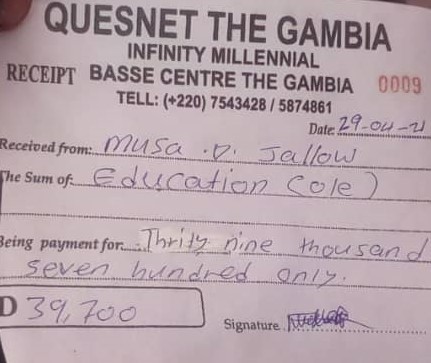
He was introduced to the business by his uncle. Jallow went to the QNet Basse Branch where he was formally introduced to the business and promised a weekly payment of D11,250.
“I made the payments to them, but since then, they haven’t paid me even once. I want my money back, but they refused to give it back to me,” he said.
Jallow said QNet officials are deceptive and they know how to lure people to join them. He expressed frustration over the matter and wants the Government to intervene to help him and many other victims to get back their money.
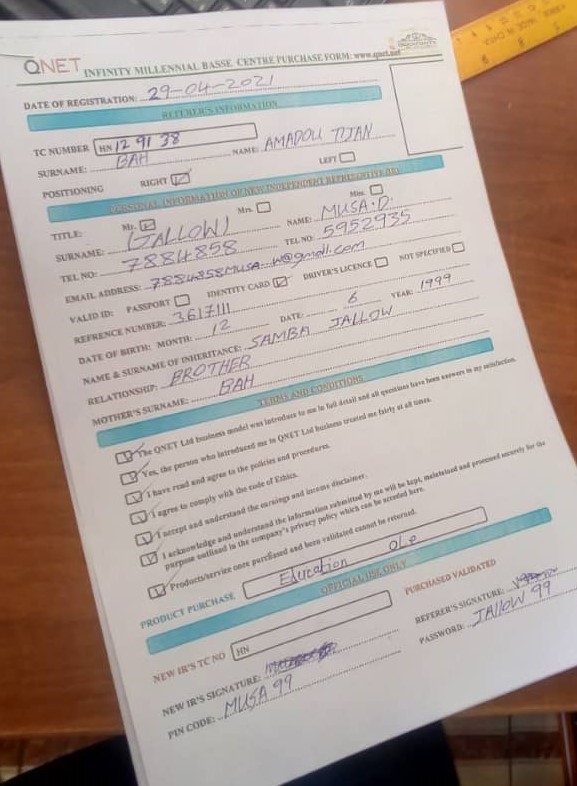
Victim 3:
Enters Sirajo Jabbie, a fresh grade 12 graduate. Jabbie was introduced to the business by one Habib Secka, believed to be a former assistant head boy at St. Francis Senior Secondary School. Jabbie, who was Secka’s classmate, pressured his aging father, a farmer, to raise money for him to join QNet. His father told Foroyaa that he took a loan from people to pay for his son to join.
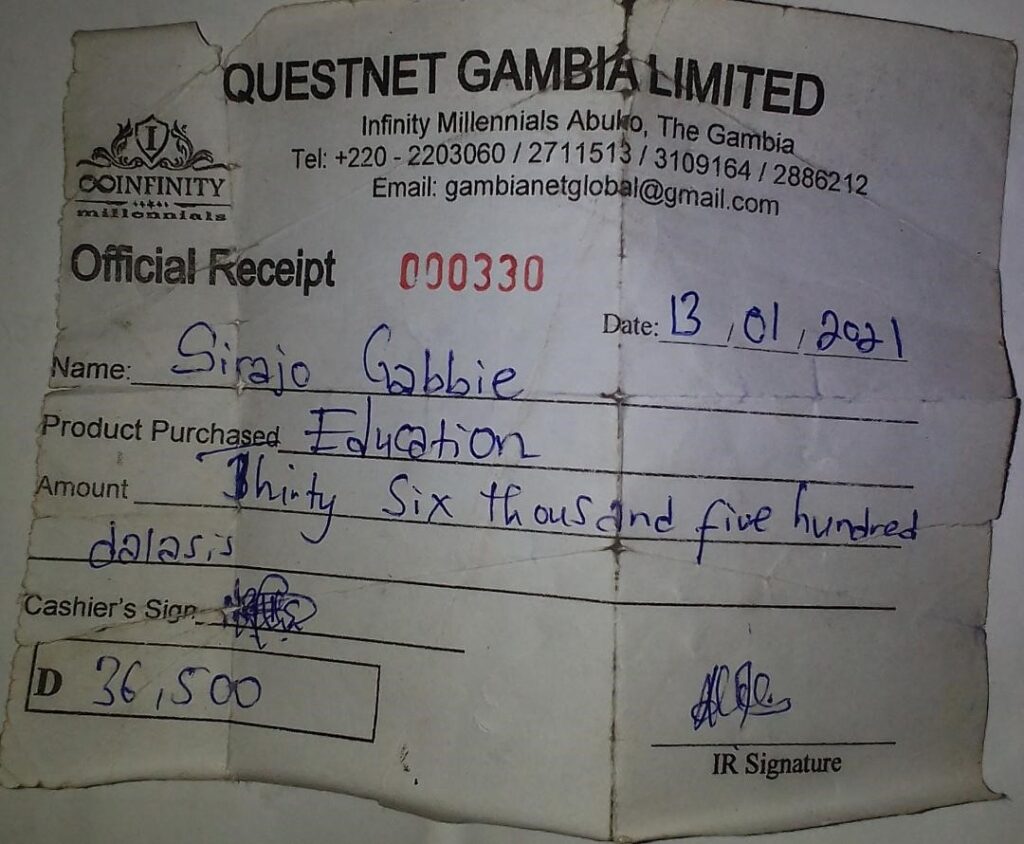
He paid D36,500 to QNet and hoped to pay back those he owed in not more than a month, if QNet pays the D11,250 per week to his son. But his hope was dashed away as his son is yet to receive any income.
Meanwhile, Jabbie’s father is not leaving any stone unturned. Now cognizant of QNet’s reported scam scheme by many victims, he had begun pushing for the recovery of the money from the company who refused to give him his money. He reported the matter to the Consumer Protection Commission who are helping him to sue the company before the Consumer Protection Commission.
Victim 4 & 5:
Many customers who become victims of QNet have accused them of deceit and misrepresentation. QNet would organise regular sessions only for those who join the scheme, purposefully to convince them to maintain the business by telling them that it has life changing potentials. Many Gambians have accused them too of luring them into an online business.
“They will train us how to fool people to come {join}. It {the sessions} is all about that,” said Abubacar Jawara.
“It is an enterprise where a person is fooled and then he is trained to fool others to earn money,” said Babucar Jarju, another victim of QNet.
Jarju was lured into the business and went to Ndarr in Saint Louis Region, Senegal, with the promise they were going to provide him international travel documents, international certificate and international work permit which he could use anywhere in the world.
Victim 6:
Ousman Marong, a resident of London Corner, was doing petty trading at the Serrekunda Market selling clothes and shoes. He was invited by a friend he trusted who was in Senegal into the business. Marong explained that he was lured because he was told the company was Cosmos Global Company appearing as if it was the American Cosmos Company.
“If you search about the company, you will see the American company’s name and this was what convinced me to make the payment of D45,000. You will only come to know that it is a QNet scam when you get to Senegal. They use the American company’s name to deceive people,” he said.
He said he was convinced to join the business and transferred the D45,000 to Senegal while in The Gambia. The money he transferred to Senegal was for the preparation of three ‘key’ documents – international bank account, international work permit and international travelling paper.
Marong said after making the payment he left for St. Louis in Senegal where the said Cosmos Company was located. He told Foroyaa that the dealers promised to help him get abroad because he is a footballer with the dream of playing abroad. He explained that he was disturbed on the first night of his arrival because of the realities on the ground.
“The accommodation was very terrible. 20 people share the same room with no beds. We used to sleep on the floor. There were about 200 people there most of whom were Gambians,” he said.
The 24-year-old said they were served one meal a day with no nutrients by the QNet personnel.
“We eat dry rice with jumbo and ‘Adja’. We cooked by ourselves and the food was not enough. Sometimes we don’t get salt,” he said.
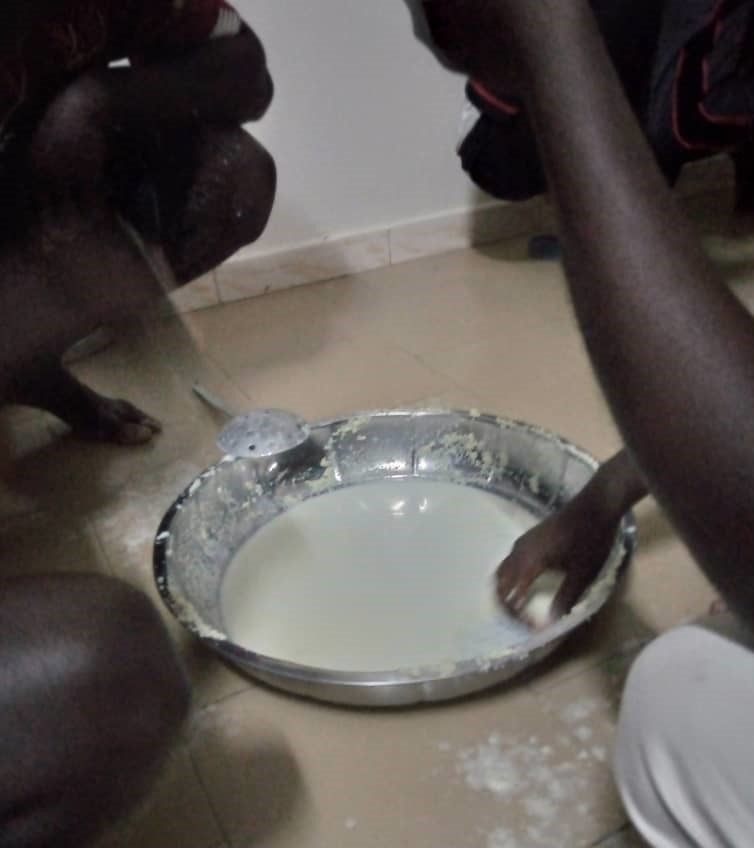
He said the alleged fraudsters would take people’s money from them on their first day of arrival in Saint Louis so that the person won’t have the chance to return.
“No one was allowed to use the internet unless we were so permitted by them. They don’t appreciate too many questions about their business. They will never disclose their business to you fully,” he said.
Marong said at the time of making the payment, he was told he will be paid $225 every Tuesday at 11 am, but his principal interest was to go abroad to play football.
“You only come to know their business when you enter it,” he said. “They will tell you it is a 90-year contract and even if you die, your family will continue to benefit from it. In fact, they will record the names of people who you want to become your next of kin. These are all means to deceive you.”
He said he was later told that he has to invite two people from The Gambia who should also invite two people in order to get the $225 pay.
“You have to lure people to join in order to get the payment,” he said.
He said every day the dealers would organise sessions for them encouraging them to maintain the business and asked them to do more in their engagement to bring more people.
“One of them, Almami Sawaneh, from Mali with the title Sofista, told us he receives $10,000 every Tuesday. They used to tell us things just to encourage us. We were motivated despite the harsh living conditions because of what they used to tell us,” he said.
Marong said some of the people who have been in the business for some time gave them titles including ‘Associate Billionaire.’ He said all their induction sessions were meant to manipulate their minds by putting in them notions that would make them appreciate the business more.
“They will tell you to invite people who trust you and not those you trust. They will sit with you and tell you what to tell the person you are trying to convince to win their minds to join them by making the payment,” he said.
“You have to go to them and connect to the internet using hotspots so that they will see what you do. They will sit by you and be telling you what to tell the person you are trying to lure into the business. You have to say exactly as instructed by them and mistakes are not allowed.”
Marong left the Gambia on the 31st December 2020 for Senegal for business after making payments and returned to the Gambia on the 5th May with empty pockets. He said during his stay, his family used to send him money to ameliorate his living condition.
Victim 7:
Bubacar Jawara, a resident of Sukuta, said he was lured into the business by his friend who told him that Cosmos Company is an American company that helps people study abroad and that they will help him get to Canada to further his education.

“I was not interested with the $225 dollars promise. I want to go to Canada to further my education. This was why I paid the D45,000 to the company before going,” he said.
He left the Gambia on 10th September, 2020 for Saint Louis in Senegal where the company was said to be based and came back on the 5th May 2021 together with Marong with the help of a Finnish lady who sent them each 5,000 CFA.
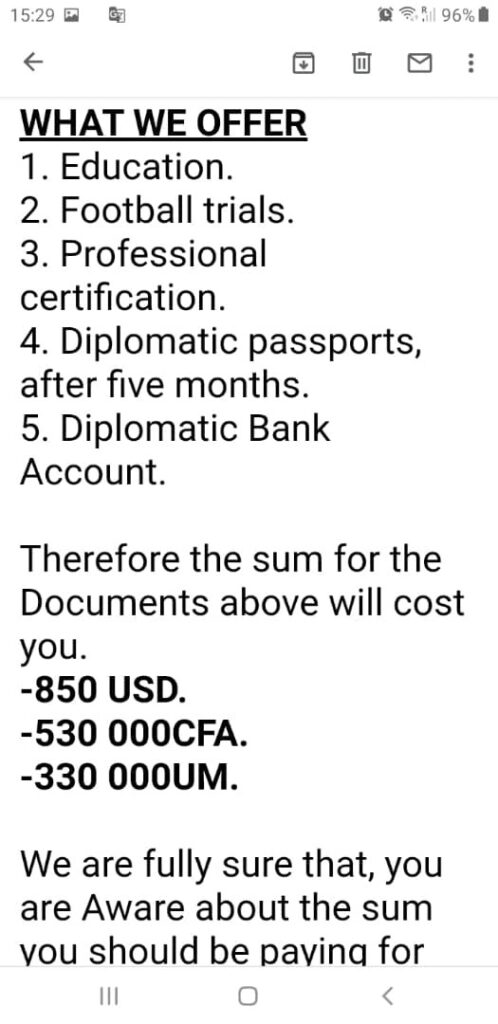
Jawara gave the same explanation of his experience, adding they could not get back their money. Marong said he spent over D85,000 while Jawara said D187,000 was spent in the business, including his (Jawara’s) friends he lured into the business.
More happened in Senegal:
About a hundred Gambians were allegedly lured to make payments to a company in Senegal branded as Cosmos Global Business Company. Each of them was asked to pay forty-five thousand (D45,000) for registration and after making the payment, they went to Senegal where they discovered it was a QNet enterprise.
The alleged victims said the scammers used Cosmos to deceive people because it is a trusted company in the United States of America. They went to Ndarr in the Saint Louis Region in Senegal where they lived in horrible conditions.
Alkali Jawara, a native of Gunjur Kuta in the Wuli East District, said he is a victim of QNet in The Gambia. He said he was lured into the business by his paternal brother in 2020. He said he is a petty trader who sells foodstuff at the Lamin Market and used his profit to start payment to QNet.
Jawara said he first thought it was a monthly paid job which motivated him to start the payment. He was told to deposit D5000 to purchase space in the company and he made the payment on 1st February, 2021. Jawara said he was asked to pay D37,500 altogether.
“The QNet guys were pushing me to take credit from people to complete my payment of D37,500 in order to be eligible to start getting payment of $225 every two weeks. I did not sign any contract with them yet and I have the receipt,” he said.
He said his shop at the market was raided by thieves on 9th April, 2021 and he does not have any money to purchase food items for sale. The 45-year-old said he told the company that he wanted his money back.
“I came to know that they were misrepresenting things they do in order to deceive people to fall for their business. I want my money but I cannot still get it,” he said. “This is a criminal enterprise. Why did the Government allow them to operate here?”
Call For Action Against QNet:
The Abuko Police Station, among other police stations, have received several complaints from alleged victims of QNET, but cannot act on their cases since the alleged victims signed contractual agreements with the alleged fraudulent company thereby making their relationship civil.
Several victims have called on the Government to investigate and close the operation of QNet in the Gambia and related companies that are into e-marketing and business to save many others who are susceptible to becoming prey of the alleged scam. Many victims are left without any resort to get their money after finding out that the company deceived them.
“They fool people. They don’t disclose things to you until after making the payment to them. They fool people and ask you to fool others to join the business,” Babucar Jawara said.
Jawara said there were about a hundred Gambians in Senegal and Maurtania who went under the name of Cosmos Global Business with the promise that they will help them. They had awful experiences in Senegal and Mauritania.
The alleged victims who went to Senegal said they paid each forty-five thousand (D45,000) to join the business. All of them said the business they were introduced to was called Cosmos Global Business Company.
According to their explanation, the alleged victims said they were told it was an American company and they will be paid two hundred and twenty-five dollars ($225) weekly after paying their forty-five thousand dalasis. The D45,000 payment they made before going to Senegal was for their housing, feeding and for three international documents which were, international bank account, international work permit and international travelling paper, but when they got to Senegal they came to know that all they were told was not true. They came to discover that it was a QNet scam using the American company’s name.
Banned in India for their dishonest doings, QNet has established themselves in many African countries, including The Gambia.
The Bombay High Court in India described QNet as fraudulent saying “the deceit and fraud is camouflaged under the name of e-marketing and business,” – this scheme is undoubtedly a multi-level marketing activity and a pyramid of structure of such scheme is prepared so that the members are promised to get money on purchase and sale of products.
QNet officials, however, denied all allegations levelled against their infamous company. They would claim the “wellness products” they sell like Biodisk and Chi Pendent are medicinal and spiritual products.
For QNet, the marketing and promotion of their products and services is carried out by their independent representatives whereas the sale of their products and services is done through the internet. The company would claim that they offer entrepreneurial opportunities to people who choose to independently market or promote their products.

The Independent Representatives of QNet in The Gambia were called to shed light on the allegation and the information Foroyaa gathered about their work, but they wouldn’t answer.
However, as a matter of public concern, our reporter wrote to the QNet Office and they responded through their Africa Office in Ivory Coast.
On whether they offer online classes, the QNET Africa Office said QNet is a direct selling company that offers a wide range of products in the areas of health, wellness, lifestyle and education through an e-commerce platform. The choice of the product is up to the customer according to his needs.
“Online Courses are part of these products. They are available under the category of QLearn. Our Online Courses are based on Micro-Learning, Certificate Courses, as well as Diplomas. Our courses are provided from Global Institutions based in the United Kingdom, United States, and Malta,” Kojo B. Williams from the Africa Office said.
However, NAQAA is saying QNet is not licensed to offer such courses in The Gambia making their activities unlawful.
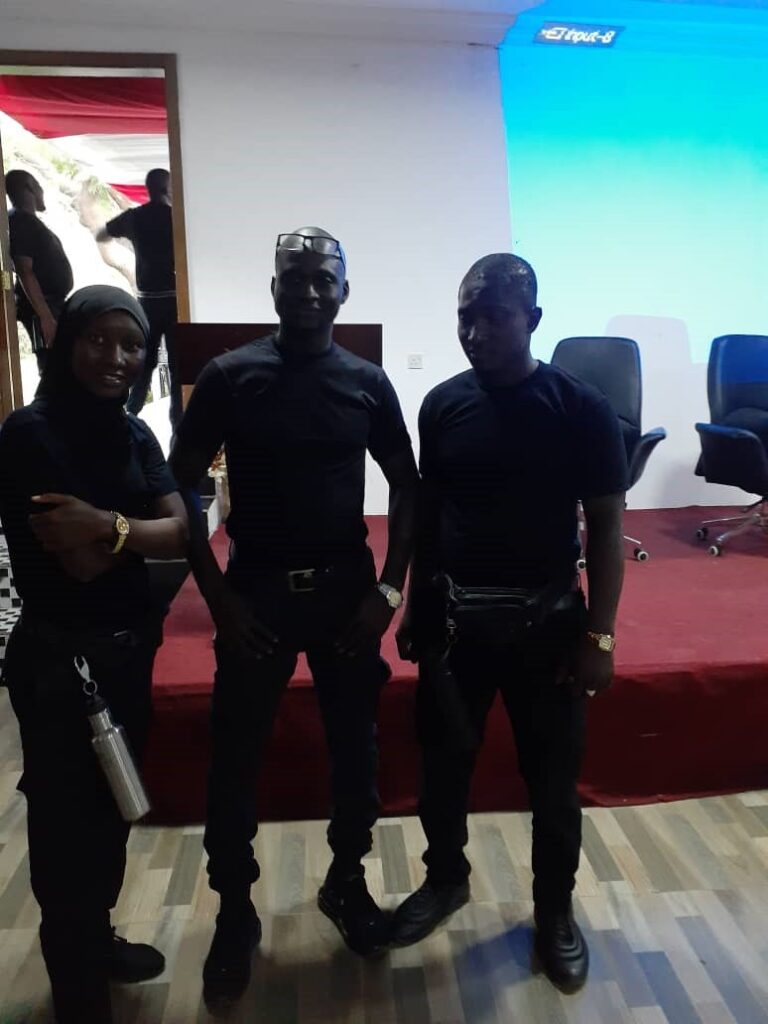
Asked why can’t people get back their payments if they are not satisfied, Mr. Kojo saidtheir returns policy is clearly stated before the purchase not only on our courses, but any product purchased from QNET. The customer has the right to return the product or refund according to Terms and Conditions they have agreed on before the purchase of the product.
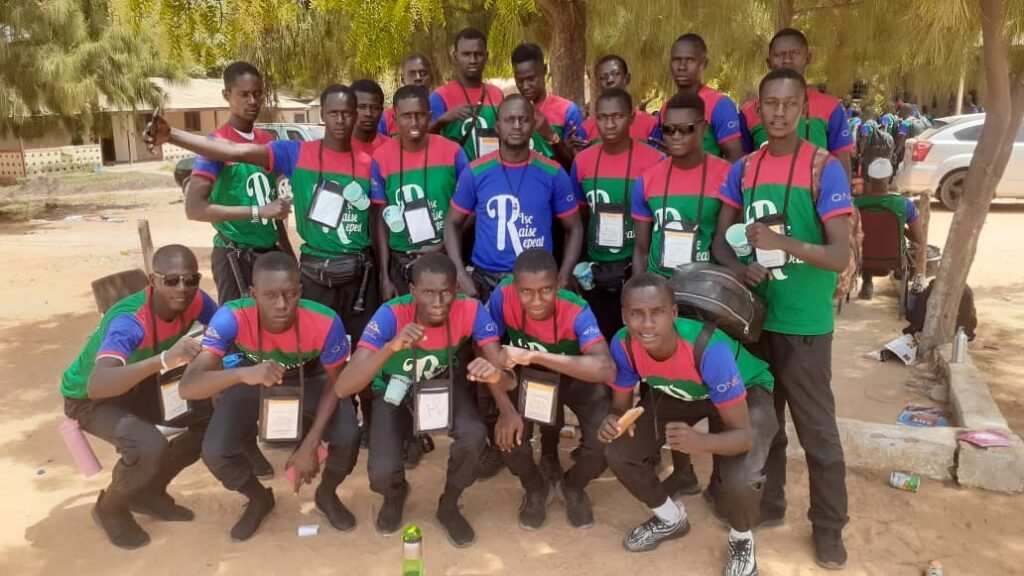
Asked why they don’t disclose their terms and conditions, Mr Kojo said their Terms and Conditions are fully disclosed before any transaction is done, saying they are available in the customer’s virtual office and can be downloaded.
“Most importantly, the customer must agree to these Terms and Conditions before being able to sign up or purchase any product. Furthermore, QNET, as any company, makes market benchmark before developing any business in a country,” he said.
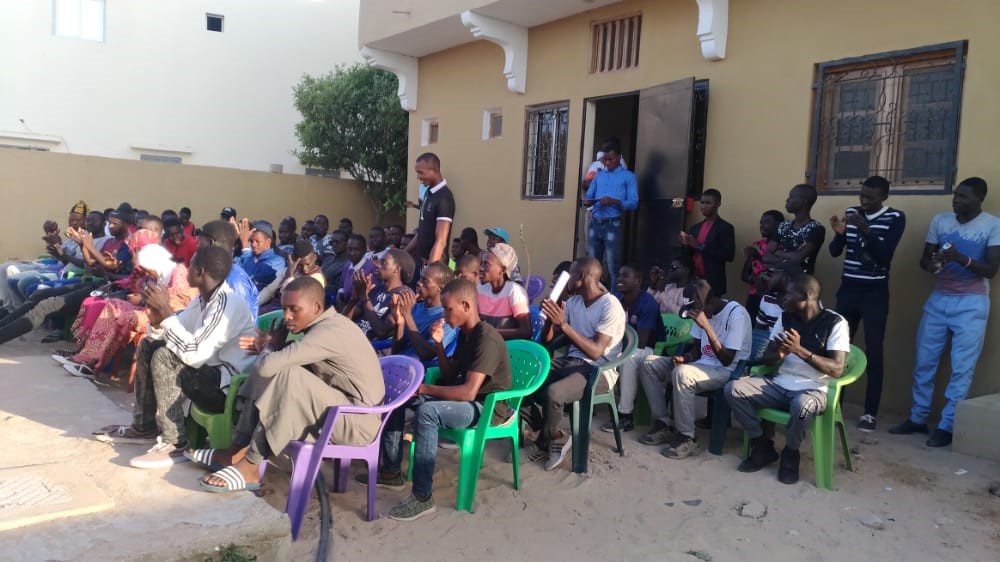
Commenting on the International Certificates they promised to give customers, Kojo said if a student/customer completes a course, an online certificate will be given to them which they can download after they have fulfilled the passing criteria for that specific course. For those who can’t download their certificates by themselves, our Global Support Centre can assist to download these certificates and send via email upon request. Occasionally, he said for those who wish, they can participate and receive their certificates at the international events QNet organizes.
Kojo said QNET has been in business since 1998 adding in the last 22 years, thousands of people around the world have benefited from its products and services and have been empowered to become entrepreneurs using its direct selling business opportunity. He stated that QNET has product sales in 100+ countries, presence in 25+ countries through offices and agencies, and over 1,000 employees of around 50 nationalities.
“QNET is the official direct selling partner of Manchester City Football Club, Total CAF Champions League, Total CAF Confederation Cup and Total CAF Super Cup,” he said.
Is QNet An Investment Scheme?
Kojo said they are not an investment scheme.
He said: “QNET is not an investment or Ponzi scheme and does not support any get-rich quick notion. It is basically networking marketing. You log on to our website www.qnet.net and see the wide range of our products. You can either buy these products and use personally for health and wellbeing or choose the entrepreneurial path by registering as an Independent Representative and refer others to buy our products. You get commission on every referral sale not on recruitment of people.”
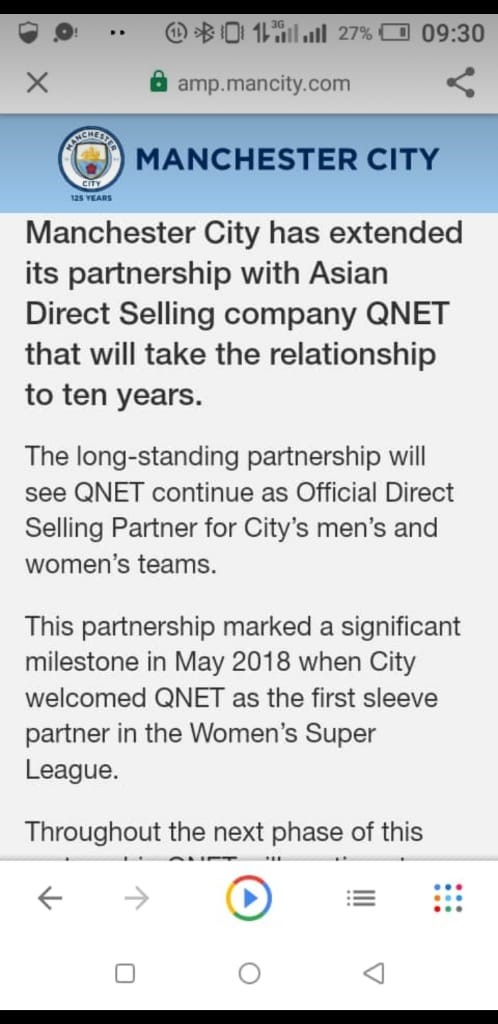
Do I Have To Recruit Other People To Make Money?
Kojo answered in the negative saying “you cannot make money in this business by recruiting anyone.
“Only pyramid schemes focus on recruiting people. Such schemes are not sustainable and will inevitably collapse. QNET’s business is based on a sustainable model that does not allow anyone to make money through recruitment,” he said.
The narration of Kojo is completely different from what happens in The Gambia. In The Gambia, people are asked to bring six people (3 left and 3 right) to be eligible for payment ($225 per week).
“QNET condemns money extortion and condone illegal gatherings or massive movement of people across borders to engage in its business. With the use of an electronic device such as mobile phone or computer, anyone can conduct business with QNET without travelling to any country,” he said.















